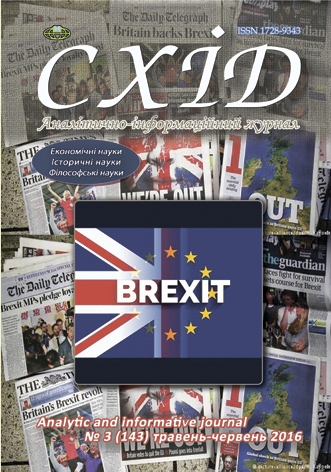The concept of liberation of Education Paulo Freire and ekoeducation
DOI:
https://doi.org/10.21847/1728-9343.2016.3(143).74860Keywords:
ekoeducation, liberation education, educational systems, metaphorAbstract
In the article analyzes the metaphor of Paulo Freire's "banking" education model, which demonstrates the shortcomings prevailing oppressive, narrative (narrative) tedious educational system and uncreative, uncritical, mechanical learning, which is opposed to the concept of liberation education and formation critical consciousness.
The fundamental difference liberation of problem oriented education is that it is based on activities rather than on mechanical information transfer, and object of knowledge acts as a mediator between teacher and student. The efforts of both (teacher and student) aimed to study the object of knowledge, providing interaction and therefore dialogue on both sides.
To develop the concept of environmental education, there is important thesis that the problem-oriented method is always "cognitive" and aimed at building critical thinking to understand the situation and the ability to navigate and act in it, and therefore directly relevant to the conservation of nature, life and health of people.
Downloads
References
Aristotle (1937), About the parts of animals [trans. with the Greek], Biomedgiz,Moscow, 219 p. (rus).
Blyumenberh G. (2005), The world is a book, Libra Publishing, Kyiv, 544 p. (ukr).
Gaidenko V. (2006), Philosophy of Education in Brazil: critical pedagogy of Paulo Freire, Philosophy of Education, № 2 (4), pp. 91-99 (ukr).
Hanaba S. (2014), Philosophical and educational ideas of Paulo Freire in the context of the modernization of history education, available at: http://science.kpnu.edu.ua/wpcontent/uploads/sites/7/2014/pdf/pdi/3/2_4.pdf
Hardashuk T. (2000), Environmental policy and the environmental movement: the current context, LLC. «CUP» Tehprynt «, Kyiv, 126 p. (ukr).
Gusev S. (1984), Science and metaphor, Publishing House of Leningrad University,Leningrad, 152 p. (rus).
Demyanchuk A. (2003), Will not get alone, in: P. Freire Pedagogy of the oppressed [trans. from English], Universe Publising, Kyiv, pp. 5-9 (ukr).
Yermolenko A. (2009), Education as formation of practical reason. Answers Anna Krytskoyi, Philosophy of Education, № 1-2 (8), pp. 39-58 (ukr).
Kotovska O.P. (2011), Arts, creator and teacher: an attempt to interdisciplinary thinking, Practical Philosophy, № 3, pp. 115-120 (ukr).
Nature: methodological and social aspects of optimization (1992), Naukova Dumka, Kyiv, 142 p. (ukr).
Rudyshyn S.D. (2014), Environmental education: methodological aspects and psychological, in: Strategy of Environmental Education in the XXI century: the All-Ukrainian, Shvets Publishing, Mykolaiv, pp. 199-205 (ukr).
Samarskyy O. (1991), Vowels and Ecology (Chernobyl, in the light of the national press), Ecology and Culture, Naukova dumka, Kyiv, pp. 190-210 (ukr).
Freire, Paulo (2007), Pedagogy of the oppressed, Continuum,New York, 168 p. (eng).
Freire, Paulo (2003), Formation of critical consciousness [trans. from English], Yunivers, Kyiv, 176 p. (ukr).
Jensen D. (2006), Metaphors as a Bridge to Understanding Educational and Social Contexts, International Journal of Qualitative Methods, Vol. 5, № 1, pp. 36-54 (eng).
Lakoff G. (1993), The Contemporary Theory of Metaphor, Metaphor and Thought (Second edition), Cambridge University Press, pp. 202-251. doi: 10.1017/CBO9781139173865.013.
Mahbubul A. (2013), Banking Model of Education in Teacher-Centered Class: A Critical Assessment, Research on Humanities and Social Sciences, Vol. 3, № 15, pp. 27-31, available at: http://www.iiste.org/Journals/index.php/RHSS/article/viewFile/7939/7947.
Midgley, Warren [ed.]; Trimmer, Karen [ed.] and Davies, Andy [ed.] (2013), Metaphors for, in and of Education Research, Cambridge Scholars Publishing, 245 p. (eng).
Downloads
Published
How to Cite
Issue
Section
License
Copyright (c) 2016 Nelya Filyanina

This work is licensed under a Creative Commons Attribution-NonCommercial-NoDerivatives 4.0 International License.
1. Authors bear responsibility for the accuracy of facts, quotations, numbers and names used.
2. Manuscripts are not sent back.
3. The publisher does not always agree with the authors' opinion.
4. The authors reserve the right to authorship of the work and pass the first publication right of this work to the journal under the terms of a Creative Commons Attribution-NonCommercial-NoDerivatives 4.0 International License. This license allows others to distribute (copy) the published work for non-commercial purposes, provided there is mandatory attribution to its authors and a link to the first publication in our journal.
5. The authors have the right to conclude separate supplement agreements that relate to non-exclusive work distribution in the form in which it has been published by the journal (for example, to upload the work to the online storage of the journal or publish it as part of a monograph), provided that the reference to the first publication of the work in this journal is included.

